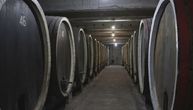Nobody lives in this Serbian village, and many dream about it: The reason is more than tempting
The complex was created in the period from the middle of the 18th century and the 1930s, and today has about 60 active wine cellars
Rajacke Pimnice is a small village on a hill near the village of Rajac, not far from Negotin in eastern Serbia. It is composed of traditional stone houses, which are used exclusively for production and storage of wine. Although it is a village, no one lives in it all year round.
Each house is a wine cellar whose owners live in Rajac, about a 15-minute walk from there. Although it could be concluded at first that these are beer cellars, the name originated from the verb "to drink" - so "pimnice" represent a place where one drinks.
The complex was created in the period from the middle of the 18th century and the 1930s, and today has about 60 active wine cellars while there used to be more than 300.
Regardless of the location, the village of Rajac itself is interesting to visit. Interesting old houses are decorated with unusual detail, and there is a church in the center of the village.
The homes were built of stone, often hewn, and logs, have thick walls, often thicker than 60 centimeters, with shingle roofs. There is the main square with a fountain in the village, as well as several small squares, around which houses are arranged in many alleys and form a unique labyrinth.
The streets are irresistible for walking, so they will simply entice you to wander through them.
Houses made of two parts
As they are primarily intended for making and storing wine, houses in Pimnice have two parts. One is buried two meters in the ground, so that the temperature differences would not affect the wine much, while the upper part of the house is intended for people to stay during the harvest.
The villages of Rajac, Rogljevo, Smedovac and Stubik are not far from each other. Together they form Negotin Pimnice, a wine cellar complex in the Negotin wine region.
Village cemetary
At the exit from Rajacke Pimnice is the Rajac cemetery, whose tombstones were made by the same stonemasons who built the houses in the village.
The tombstones are made of hewn stone, and the fact that inhabitants of Rajac get buried next to the village where they kept their wine, rather not next to the place where they lived, speaks enough about the importance of wine in the lives of people from these parts.
In the center of Rajacke Pimnice is a centuries-old consecrated mulberry tree where village feasts used to be held (celebraring St. Trifun and the Holy Trinity) and where processions would end.
History of Pimnice
There is no reliable data on when the first houses were built. Some have the year of construction engraved on them, while others are assumed to have been built in the second half of the 19th and the first half of the 20th century.
There used to be a large number of such settlements with wine cellars, but today only a few have been preserved.
Of the numerous settlements located northwest and south of Negotin, only a few basement complexes remain.
Otherwise, Rajacke Pimnice were added to the list of nominated World Heritage sites of the United Nations Educational, Scientific and Cultural Organization (UNESCO) in 2010.
The list includes 12 sites in Serbia which are placed under this organization's protection as places of exceptional importance for world's culture, science and education.
(Telegraf.rs)

